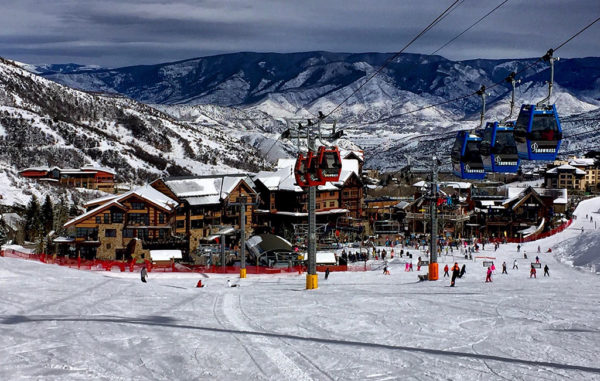
Alterra Mountain Co. closed all of its resorts on March 14, 2020, including Snowmass. (BusinessDen file photo)
Alterra Mountain Co. has agreed to pay $17.5 million to skiers who bought an Ikon Pass and were unable to fully use it during the pandemic year of 2020.
U.S. District Court Judge Raymond Moore approved the settlement Jan. 27. He also ordered Alterra to pay $2.9 million in attorney fees to the plaintiffs, over Denver-based Alterra’s objections.
“Alterra was forced to cut the (2019/2020) ski season short because of the pandemic but, unlike its main competitor Vail Resorts, refused to give passholders even partial refunds for their unused season passes,” said Simon Franzini, a lawyer for the passholders.
He said 2019/2020 Ikon Pass holders will receive between $10 and $150 in pass credits. Those who skied little that year will get the maximum, those who skied more will get less.
“It feels good to get a real, meaningful recovery for class members. And I am especially happy with this settlement because the funds are deposited automatically in passholder accounts — meaning that all class members will benefit, even without filing a claim,” Franzini said.
Ikon Pass holders filed a dozen lawsuits against Alterra in April 2020, “while the legal landscape surrounding COVID was very much unsettled,” Moore noted last month. Those were consolidated into one class-action case that was litigated for nearly three years.
The skiers alleged they were owed a refund because their Ikon Pass granted them unlimited access to Alterra resorts, such as its Winter Park Resort, but those resorts were closed in mid-March 2020, “with months left in the ski season,” according to their lawsuit.
Alterra tried to have the lawsuit thrown out in October 2020, arguing that it was based on the “faulty premise” that Ikon Pass holders are guaranteed a certain number of months to ski. “Such a promise would make no sense for something as variable as a ski season.”
“Just as pass holders are not required to pay extra when conditions allow the ski season to extend into May, June, or even July, neither are they entitled to a refund when conditions require resorts to close in mid-March,” the company wrote in its motion to dismiss.
Moore agreed to dismiss some allegations against Alterra in June 2021 but allowed others to move ahead, including the claim that it breached its contract with passholders.
In August 2022, the two sides reached a settlement. It was then finalized and approved.
Alterra fared far worse in its legal case than Vail Resorts, which was similarly sued for breach of contract in April 2020 by Epic Pass holders. That lawsuit was dismissed in March 2022 by U.S. District Court Judge Brooke Jackson, who determined that Epic Pass contracts allow Vail Resorts to shutter its resorts anytime skiing is unsafe, including during a pandemic.
“Skiing was too dangerous, so Vail closed its resorts,” the federal judge wrote then. “Plaintiffs nowhere allege that passholders could ski and snowboard safely after March 15, 2020. They therefore fail to allege that Vail breached its contractual obligations.”
Vail Resorts later agreed to give 2019/20 passholders a discount on 2020/21 passes.
Meanwhile, Alterra’s lawsuit against its insurer in Denver District Court is still ongoing.
The resort company sued Boston-based Lexington Insurance Co. in September 2021, accusing it of refusing to cover more than $200 million in losses due to the pandemic. Lexington says that Alterra’s insurance policy doesn’t cover losses from pandemics.
In the class-action case, Alterra was represented by four attorneys from the Denver-based firm Wheeler Trigg O’Donnell: Ryan Cooke, Kathryn Reilly, Andrew Unthank and Natalie West. It was also represented by three attorneys from the Los Angeles-based firm Quinn Emanuel Urquhart & Sullivan: Shon Morgan, Robert Schwartz and Michael Williams.
The plaintiffs were represented by 28 attorneys from 18 law firms around the country.
